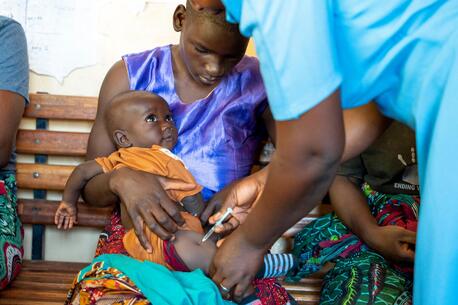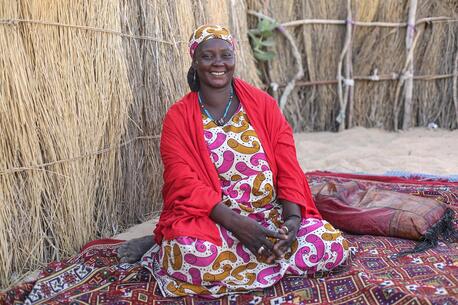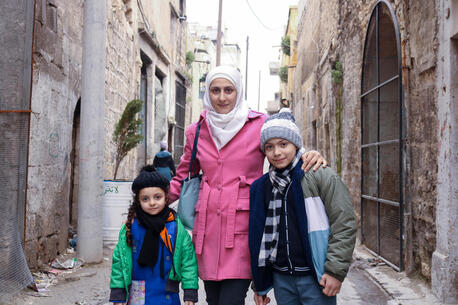
UNICEF Won't Stop Helping Children in Syria
As children across Syria continue to face many risks to their physical and mental health and future well-being, increased donor support is needed to help expand and sustain the impact of UNICEF's multi-layered humanitarian response in the country.
March 15, 2024, marks 13 years of war in Syria — one of the world's most complex emergencies
The situation remains dire for children and families in Syria after 13 years of conflict, continued displacements and social and economic collapse.
The poverty rate is nearly 90 percent. Most families have seen their resources depleted amid skyrocketing prices and shortages of basic supplies. Employment opportunities are limited. Faced with increased hardship, some turn to negative coping mechanisms like child marriage and child labor.
The systems underpinning essential services were already flailing, and critical infrastructure already severely weakened, when a deadly earthquake struck the northwest region in February 2023, resulting in billions of dollars worth of damages and losses and compounding existing crises.
UNICEF's humanitarian mission in Syria is a mix of emergency response and longer-term measures to shore up water and sanitation, health care, education and social protection systems. Together with partners, UNICEF reached over 15.8 million people with assistance in 2023 — including 10 million children.
As children all across Syria continue to face many risks to their physical and mental health, safety and present and future well-being, increased donor support is needed to help expand and sustain the impact of these efforts.
Here's a look at some of the ways UNICEF is making a difference in for children in Syria.
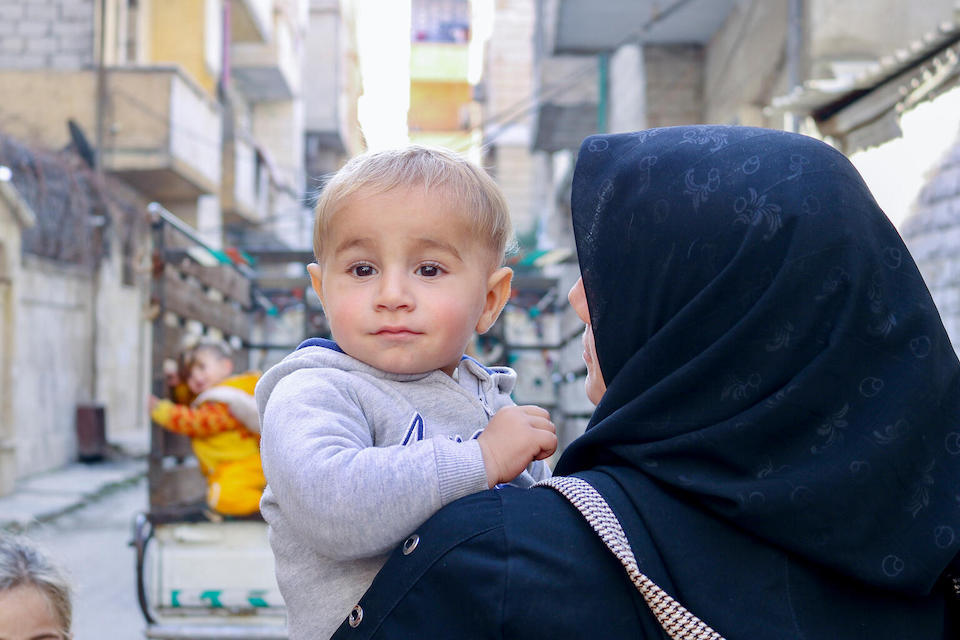
Fighting child malnutrition, ensuring access to health services — even in hard-to-reach places
Manal and her family of seven live in the Naqqarin neighborhood of Aleppo city, and share a house with two other families. Manal's husband, the sole breadwinner, is a daily laborer and struggles to make ends meet.
“We never have enough food," Manal says. "The house is full of hungry children. How would you say ‘No’ to a child when they ask for food?"
A UNICEF-supported mobile health and nutrition team visited the family in 2022. Manal, who was pregnant at the time, and her four children were all screened and diagnosed with malnutrition. “I was relieved we weren’t sick, but I was hurt," Manal says. "I couldn’t provide basic food items for my children. It’s their basic right to have food and I am responsible for it.”
The screenings are part of a package of nutrition support services these mobile teams provide. They also distribute preventive and curative nutritional supplies — micronutrient powder, high-energy biscuits, Ready-to-Use-Therapeutic Food (RUTF) — to prevent and treat malnutrition, and mothers are counseled on optimal feeding practices for infants and young children, including breastfeeding and complementary feeding.
“I am thankful for the nutrition team," Manal says. "They regularly followed up on how we were doing even after the recovery."
Families in other areas are benefiting from mobile team services. In Suwaidan Shamiya village, rural Deir ez-Zor governorate, the UNICEF mobile team is the only source of medical care.
“We announce our visits to the village through community leaders, the pharmacist and the mosque there to make sure families get to their appointments and come to receive help," says Dr. Mara'e, a pediatrician with the unit.
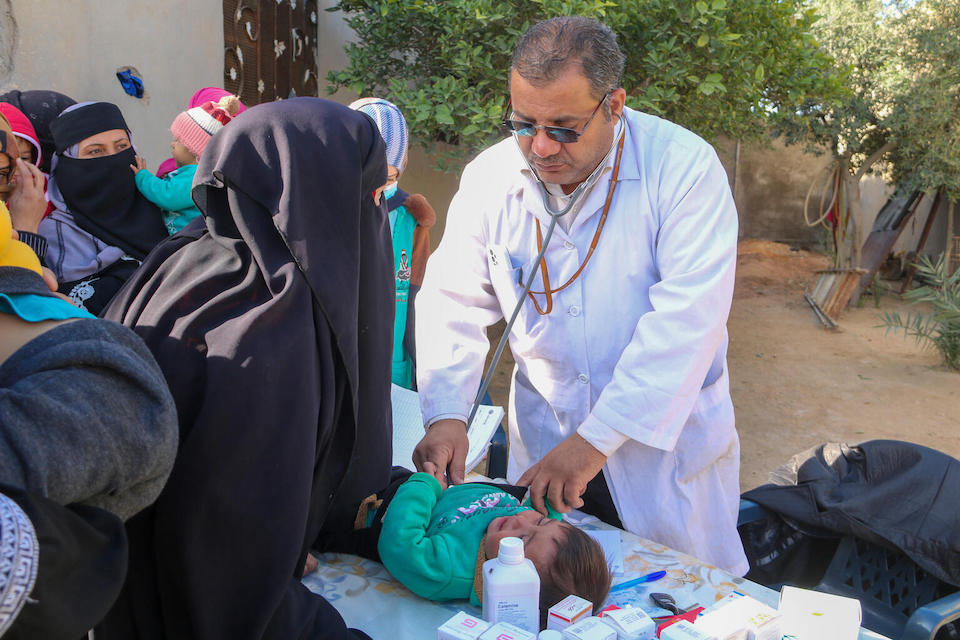
The area has become home to many families displaced by the conflict. "We know that families’ purchasing power is limited," Dr. Mara'e says. "They prioritize buying basics, such as food for their children, over transportation fees to visit a medical clinic in the city. Due to many reasons, including skyrocketing food prices, low rates of breastfeeding and early marriage among young girls, malnutrition rates in this area are soaring.”
In 2023, UNICEF reached 1.17 million children and 401,700 women with nutrition services, either through one of 62 mobile teams or at 86 fixed clinics across the country. UNICEF also reached 1.88 million children and more than 171,000 women in Syria with primary health care services last year.
Vaccinating children to rebuild immunity, contain disease outbreaks
Years of conflict has displaced millions of families — many of them several times over. That makes it difficult to stay current with routine health services like immunization.
Alongside partners, UNICEF is working across Syria to build back immunity against vaccine-preventable diseases like measles and polio.
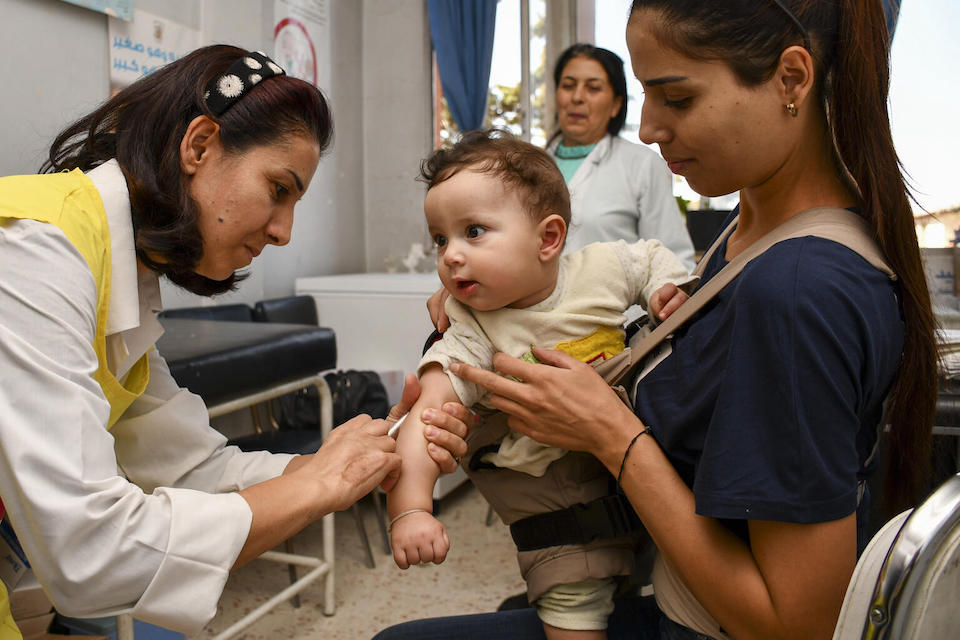
UNICEF procures and supplies vaccine doses for millions of children in Syria every year. UNICEF also supports community volunteers who go door-to-door to encourage caregivers to get their kids vaccinated, meet with community leaders, conduct public information sessions and distribute educational materials to help dispel vaccine myths. UNICEF-supported mobile vaccination teams reach children in rural and remote areas and displacement camps.
"I’m proud of what I do," says Malka, 34, a UNICEF-supported health worker at the Al-Hol camp in northeastern Syria. “Working in the camp is not easy and with the spread of inaccurate and negative information about vaccines, convincing people that vaccines work is an added challenge."
A massive routine vaccination campaign conducted by UNICEF in partnership with the World Health Organization reached nearly 2.2 million children in Syria in 2023, including more than 506,000 children who had never received a single vaccination, reducing the country's percentage of zero-dose children to 20 percent. The effort boosted overall immunization coverage to 80 percent, up from 68 percent in 2022.
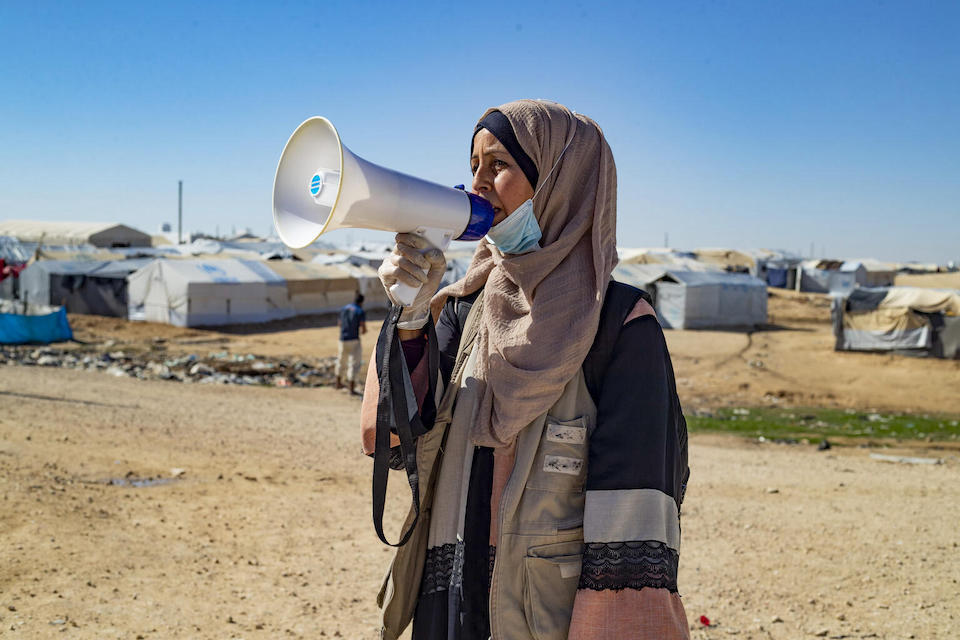
Helping children recover from trauma with mental health and psychosocial support
Manar, 13, has grown up knowing nothing but war. She has no memories of her father; he died because of the conflict when she was 1. In 2017, Manar and her grandmother moved to her uncle’s house in Deir ez-Zor City. Her mother had decided to move back to her parents’ house on the outskirts of the city.
"I love my uncle’s family," Manar says. "He and his wife [Khadijeh] are like parents to me, and their children are like my own siblings, but I’ve always felt sad despite being surrounded by people who love me."
But Manar spent most of her time alone, not interacting much with anyone. Khadijeh tried to get her to open up but had no luck. One night, Manar woke up screaming and calling for her father. “I didn’t realize that the loss of her father caused her so much pain," Khadijeh says.
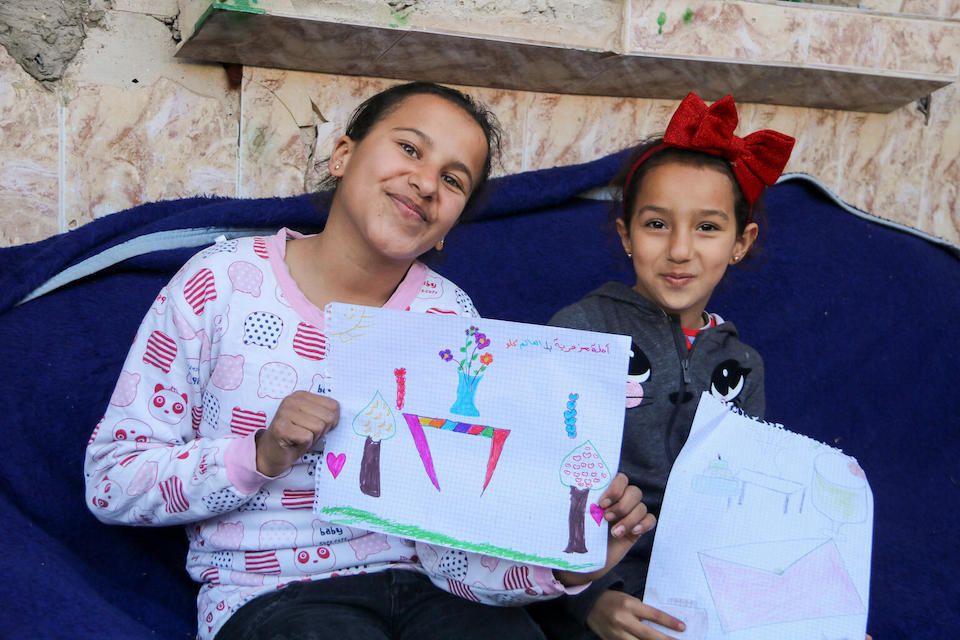
In January 2024, a UNICEF-supported child protection team started visiting schools in Deir-ez-Zor to reach children with mental health and psychosocial support sessions; Manar’s school was one of them.
Session activities are designed to help children learn how to express their feelings and better understand and manage their emotions. “Manar has made progress since the sessions at her school began," Khadijeh says. "She has overcome her shyness and has more courage to socialize with us and her friends."
In 2023, UNICEF reached close to 560,000 girls and boys across Syria with mental health and psychosocial support.
Restoring access to safe water
The people of Syria continue to endure a severe lack of basic water, sanitation and hygiene (WASH) services due to the protracted conflict, drought and water scarcity, earthquake-related damage to WASH infrastructure and a number of other factors.
Poor WASH access, particularly among displaced populations, is one of the main reasons Syria also continues to battle a major cholera outbreak.
UNICEF has been working steadily with partners to improve access to WASH services and support while also supporting the cholera response.
In rural areas of Aleppo governorate, for example, where the water system had suffered extensive damage due to the conflict, UNICEF and partners have rehabilitated water tanks, built pump rooms and installed solar panels to increase the safe water supply and improve system resilience and sustainability.
“Once, I surprised my mother and washed the dishes because we have water now," says 6-year-old Lama of Tal Aran, south rural Aleppo. "She rewarded me with cake! I love cake. My mother bakes it for me, or when my father has enough money, he buys some from the supermarket."
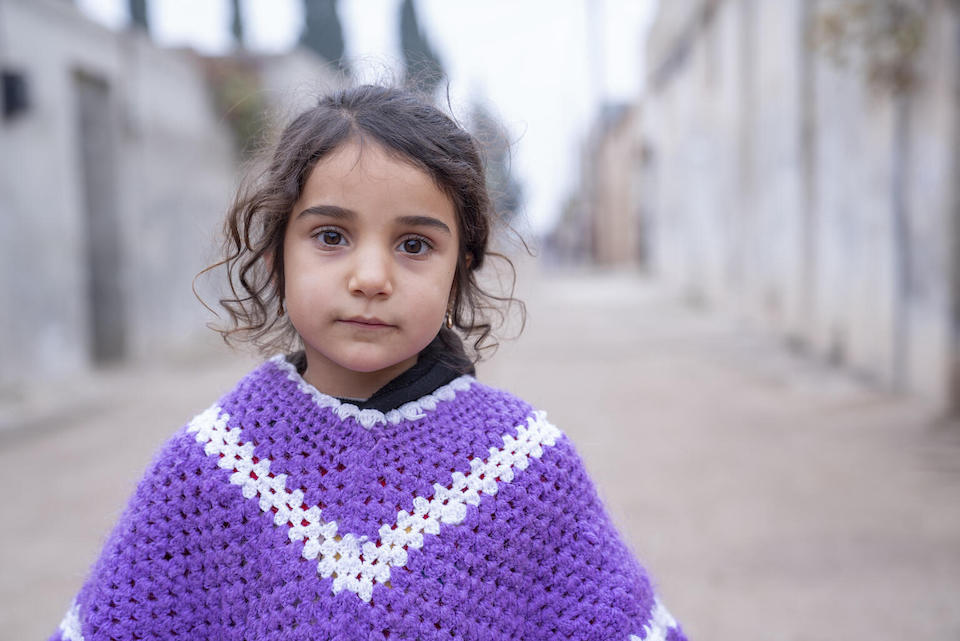
In 2023, UNICEF and partners reached roughly 8.9 million people with WASH services and supplies, and efforts to rehabilitate water infrastructure benefited over 4.4 million people. With energy shortages affecting capacities, UNICEF has shifted efforts toward renewable energy solutions, particularly solar power.
With 46 percent of Syrians still without sufficient access to safe water and sanitation, there is a lot more work to be done.
Supporting children's right to an education — including children with disabilities
Children's education is another major priority for UNICEF in Syria.
Some 2.4 million children aged 5-17 years are out of school — nearly half of all school-aged children in the country — and 1.6 million are at risk of permanently dropping out. One of every three schools are closed — either because they have been damaged or destroyed, or are being used as shelters for the displaced or for other purposes.
The longer children stay out of school, the more difficult it is for them to catch up. And when children are out of school, they are also more likely to fall prey to child labor, child marriage, trafficking or recruitment into fighting.
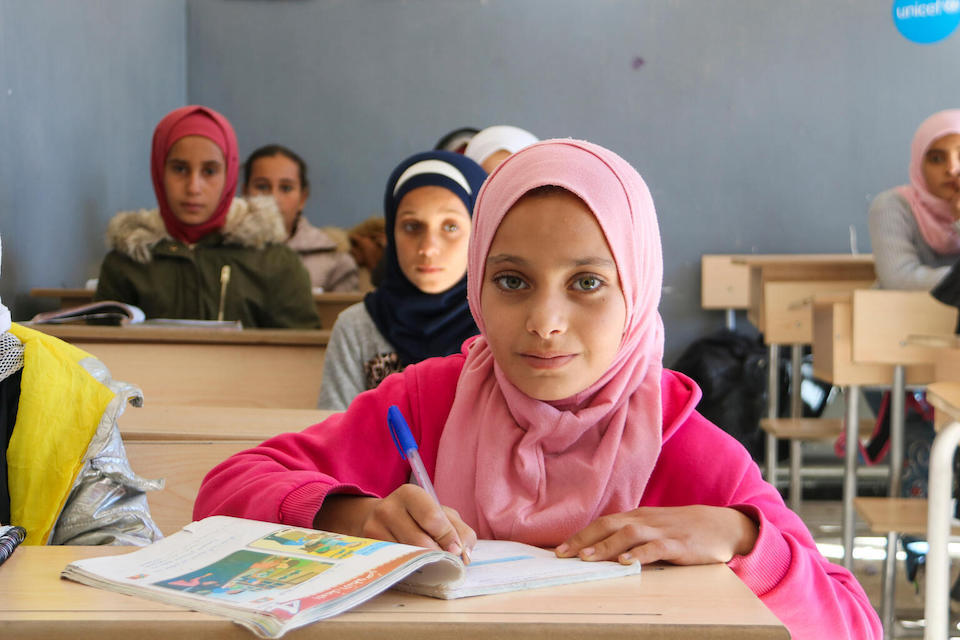
In 2023, UNICEF helped 3 million children access education in either formal or non-formal settings. UNICEF also rehabilitated and helped repair hundreds of schools last year, working with partners to make sure environments were gender-sensitive and inclusive.
Where school buildings remained inaccessible, UNICEF installed over 100 temporary learning spaces. And the Learning Passport digital platform was expanded across 14 governorates, reaching thousands more children who would otherwise lack access to education.
Additional program support helps ensure children with disabilities do not get left behind. After missing four years of school, Fayez, a 10-year-old boy with cerebral palsy who lives in Hama, west-central Syria, is back in class with support from a case manager, provided by UNICEF, along with cash assistance that paid for medical treatments and specialized walking shoes.
"Najmah taught me about interacting with the other children in class and during recess and what to do if someone bullies me," Fayez says. “My friends at school take care of me. If I fall, they come to help me get up right away, especially Zakaria. He helps me grab my walker.”
To support adolescent development, there are UNICEF-supported life skills programs designed to encourage community engagement and promote social cohesion. Specialized child protection prevention and response services help ensure children are safe from violence, abuse and exploitation in their homes, schools and communities.
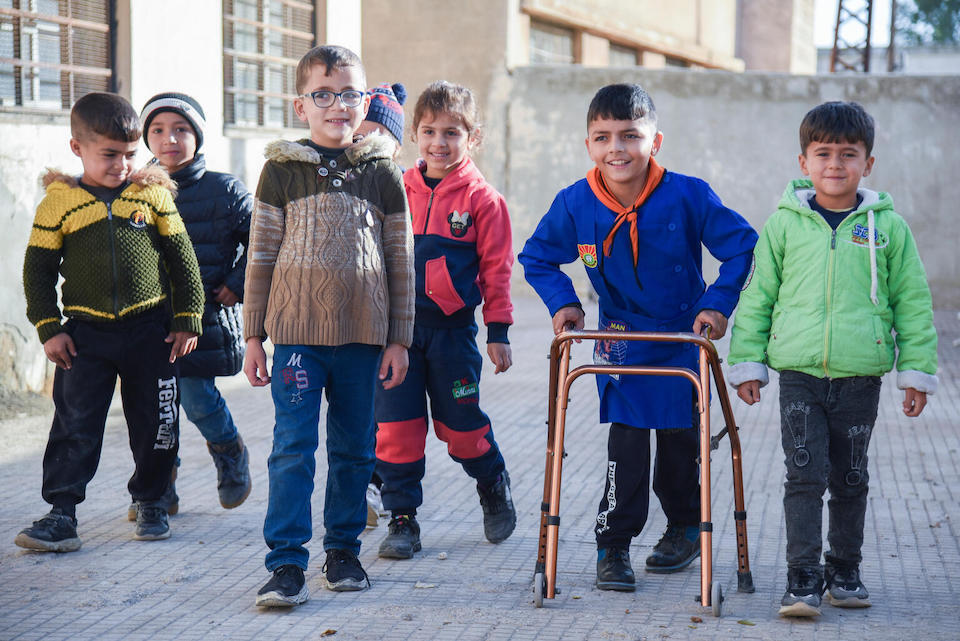
UNICEF won't stop helping children in Syria. Flexible funding allows UNICEF and its partners to respond with rapid and sustained action to changing needs on the ground — in Syria and other countries where children are affected by conflict. Learn more about what UNICEF does to ensure that children are healthy, educated, protected and respected.

